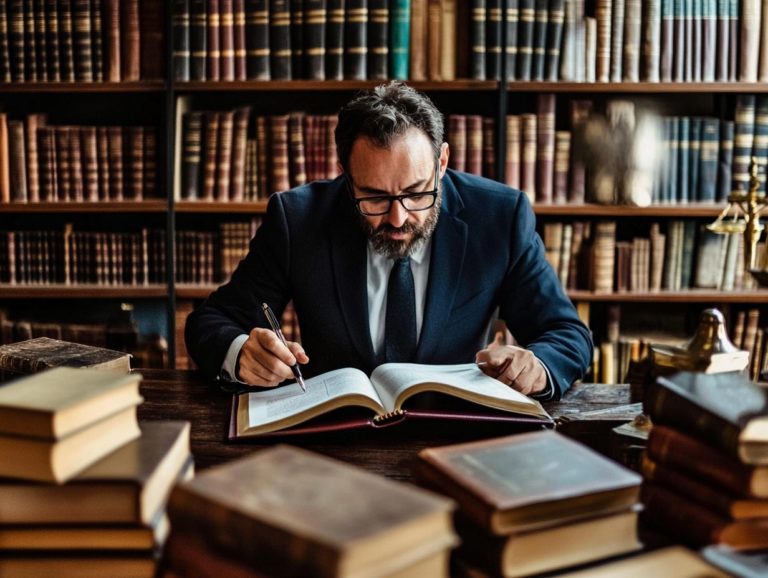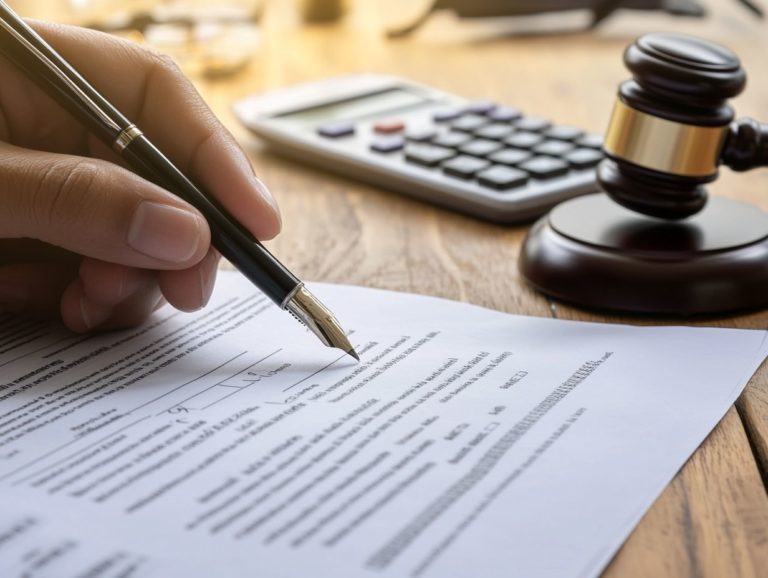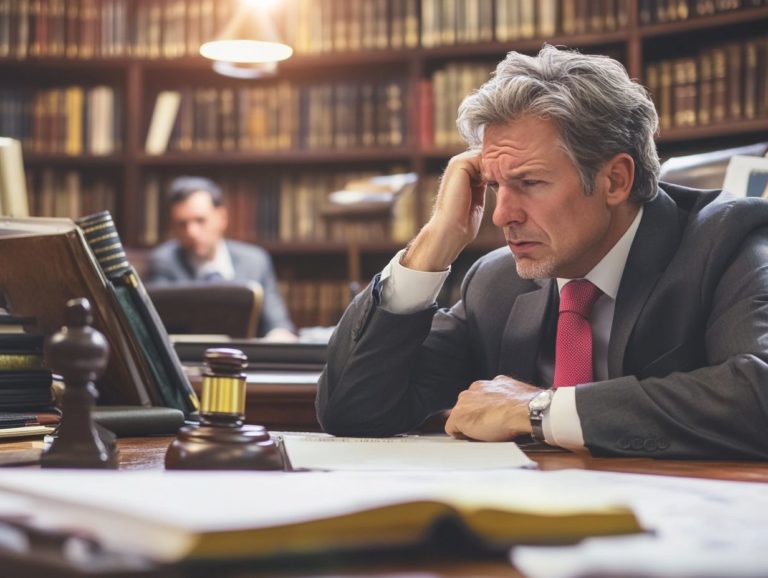Understanding the Role of Your Defense Attorney
Navigating the legal system can feel overwhelming, particularly when you find yourself facing criminal charges. A defense attorney is indispensable in this scenario, working diligently to protect your rights and advocate for your best interests.
This guide delves into the important qualities you should seek when selecting a defense attorney, along with insights on how to collaborate effectively with them. You’ll discover the strategies they employ to construct a formidable case.
This guide also covers the trial process and outlines potential outcomes. Grasping these elements can profoundly impact your legal journey.
Contents
- Key Takeaways:
- The Importance of a Defense Attorney
- What to Look for in a Defense Attorney
- Working with Your Defense Attorney
- The Defense Attorney’s Strategy
- The Trial Process with a Defense Attorney
- Possible Outcomes with a Defense Attorney
- Frequently Asked Questions
- What is the role of a defense attorney?
- How does a defense attorney differ from a prosecutor?
- What are the responsibilities of a defense attorney?
- Can a defense attorney guarantee a specific outcome for my case?
- Can I choose my own defense attorney?
- What should I expect from my defense attorney during my case?
Key Takeaways:
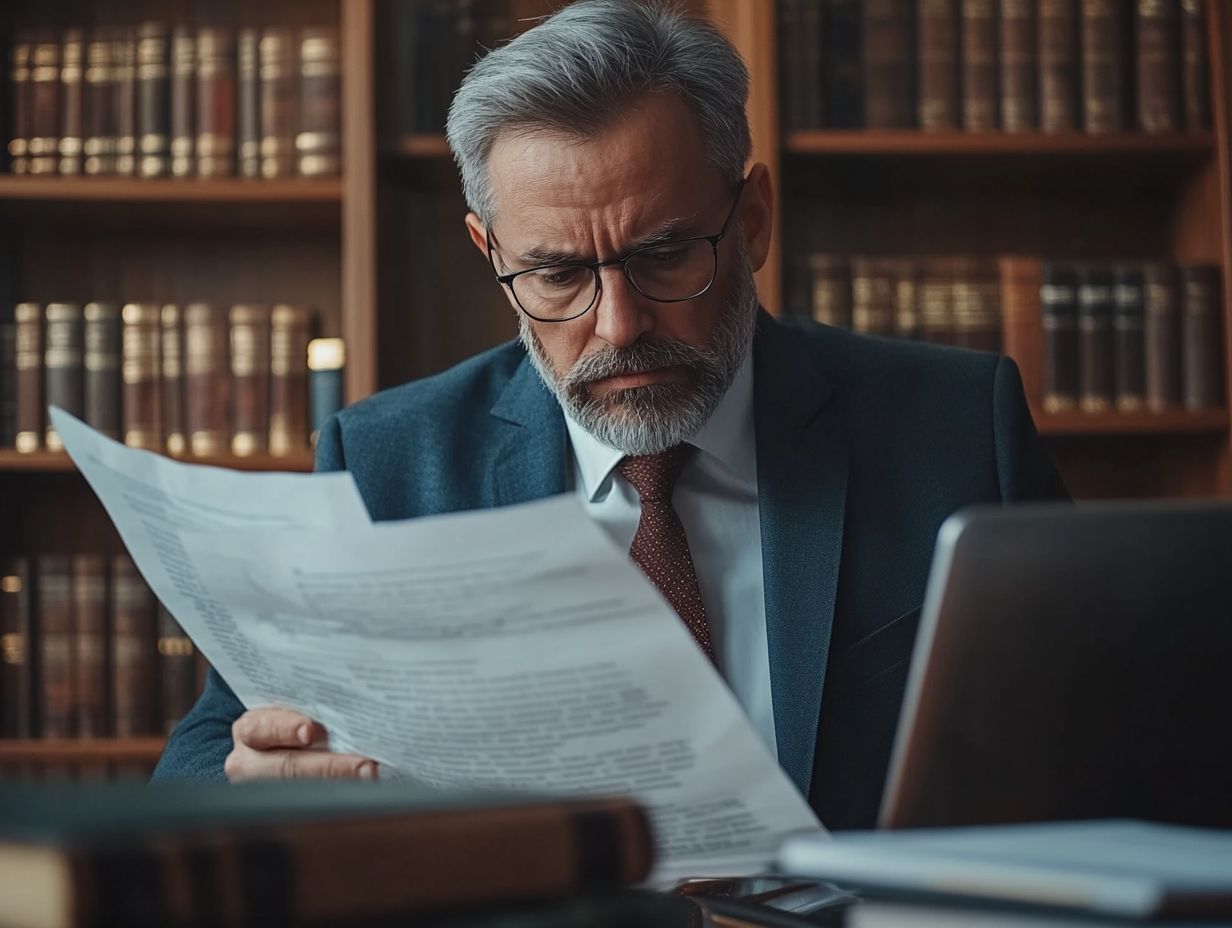
A defense attorney is essential in protecting your rights. Look for experience, communication skills, and a collaborative spirit when choosing one.
The Importance of a Defense Attorney
The role of a defense attorney is crucial in the criminal justice system. They stand as your primary advocates when facing criminal charges, ensuring that your constitutional rights are upheld throughout the legal process.
A skilled defense attorney can significantly affect your case’s outcome. They provide support, craft effective legal strategies, and expertly navigate the complexities of courtroom proceedings and plea negotiations.
Their expertise aids in trial preparation and evidence analysis and guarantees that you receive a fair trial. This underscores the importance of having competent legal representation when confronting serious legal challenges.
Understanding Their Role in the Legal System
A defense attorney’s role in the legal system is to ensure that you receive fair representation against the prosecution, skillfully navigating courtroom proceedings with a well-crafted legal strategy.
To achieve this, they carefully look at evidence, examining every detail to construct a compelling case. By evaluating the strengths and weaknesses of your situation, they can develop effective defense strategies that uphold your constitutional rights.
Negotiation skills are essential in this process, as attorneys often engage in discussions with opposing counsel to secure favorable plea agreements, sparing you from severe penalties.
Diligent trial preparation involves gathering witness testimonies and expert opinions to present a robust defense in court. Through these efforts, defense attorneys advocate for justice and fiercely protect your legal interests.
What to Look for in a Defense Attorney
Finding the right defense attorney is crucial for your future. It’s essential to evaluate a range of qualities that guarantee robust legal representation.
Look for someone with extensive experience in criminal law, sharp negotiation skills, and the ability to offer emotional support throughout the judicial process. These attributes can make all the difference in your experience and outcome.
Qualities and Skills to Consider
When evaluating a defense attorney, key qualities to consider include exceptional negotiation skills, extensive courtroom experience, and a proven track record in crafting effective defense strategies tailored to your unique case.
These attributes are pivotal in shaping legal outcomes. For example, exceptional negotiation skills can be the deciding factor between a reduced sentence and a lengthy prison term; a skilled attorney might secure a plea deal that significantly minimizes penalties.
Extensive courtroom experience not only helps anticipate prosecution tactics but also boosts the attorney s confidence, resulting in a more compelling presentation of your defense. A solid track record demonstrates their ability to navigate complex legal scenarios effectively.
Equally important is the emotional support and advocacy your lawyer provides. This establishes trust and facilitates open communication, giving you the power to feel informed and confident throughout the legal process.
Don’t wait; secure the best defense attorney you can today!
Working with Your Defense Attorney
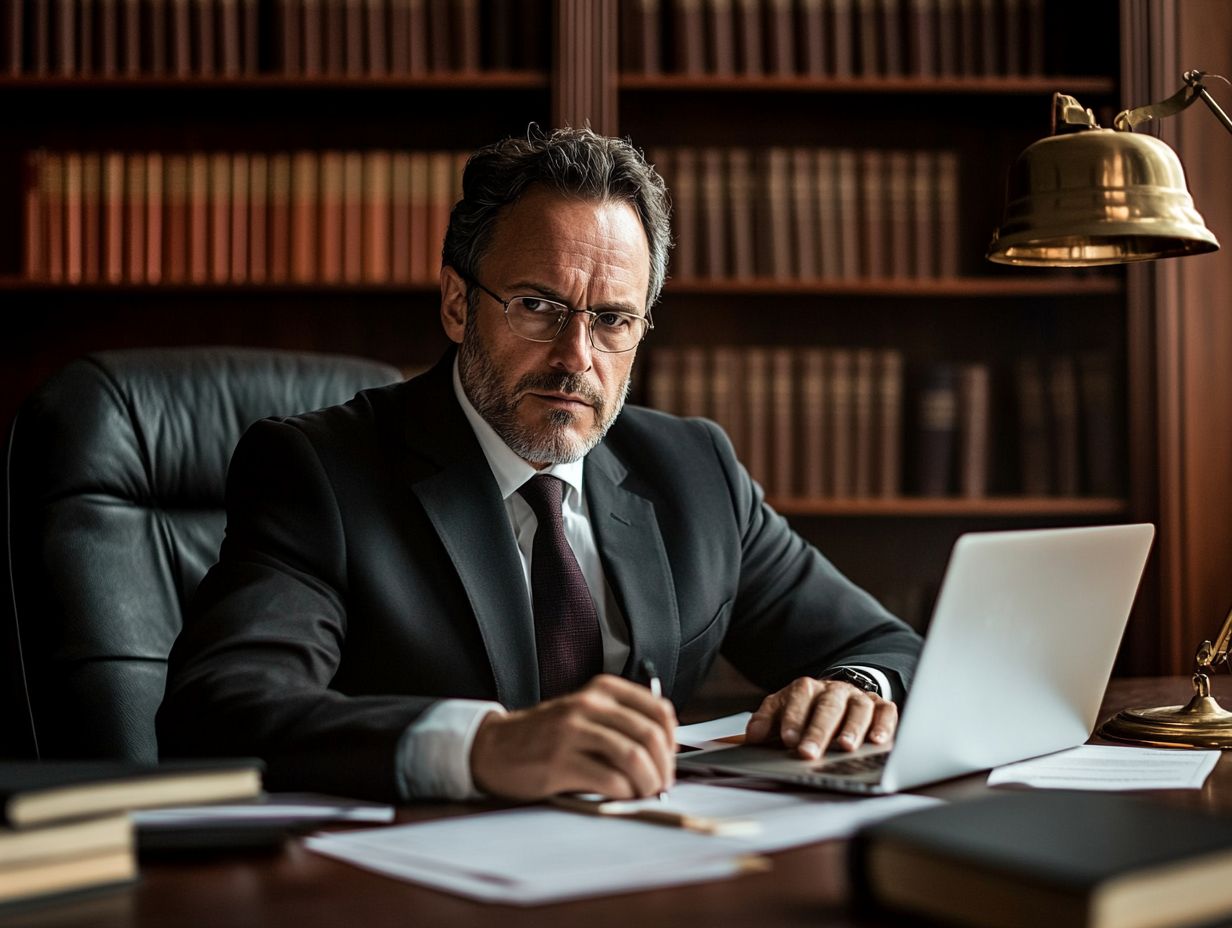
Effective collaboration with your defense attorney is essential for achieving a favorable outcome in any criminal case. When you maintain open communication, you cultivate trust and ensure that both you and your attorney are fully aligned on legal strategies and objectives.
Communication and Collaboration
Effective communication and collaboration between you and your defense attorney are key to gaining a comprehensive understanding of the legal process. This partnership ensures that all critical evidence is meticulously analyzed for your case.
When communication flows smoothly, it fosters a trusting relationship. You ll feel empowered to share essential details and voice any concerns. This open dialogue uncovers vital information that could influence the trial and enables your attorney to tailor their strategies to fit your unique situation.
For example, employing active listening techniques and paraphrasing your accounts can clear up any misunderstandings. Regular updates on your case s progress can help ease your anxiety. Involving you in mock trials or role-playing exercises boosts your confidence and readiness, making you feel supported and engaged throughout the process.
These strategic communication practices are crucial for navigating the often daunting landscape of courtroom proceedings and achieving favorable outcomes.
The Defense Attorney’s Strategy
A well-crafted defense strategy is crucial as you navigate the intricate landscape of criminal charges. This involves meticulous trial preparation, thorough evidence analysis, and, when suitable, skillful negotiation of plea deals.
Each element plays a vital role. It ensures you re well-equipped to tackle the challenges ahead.
Building a Strong Defense
Building a strong defense requires you to analyze scientific evidence collected during the investigation, gather witness statements, and develop a tailored legal strategy that takes into account all factors that can lessen the charges against you.
This process starts with a comprehensive investigation. Every detail is scrutinized, and the context of the incident is thoroughly understood.
Investigative strategies, such as interviewing key witnesses and examining physical evidence, play a crucial role in uncovering information that may not be immediately apparent.
A rigorous case evaluation allows you to identify potential weaknesses and strengths. This leads to better-informed decisions.
Each component, from fact-finding to strategic planning, significantly contributes to crafting a more compelling narrative, ultimately increasing your chances of achieving favorable verdict outcomes.
The Trial Process with a Defense Attorney
Grasping the trial process can empower you as a defendant. It encompasses various stages, such as jury selection and opening statements.
Each of these stages is navigated with the expertise of a skilled defense attorney, ensuring you have the guidance needed to traverse this complex landscape effectively.
What to Expect in Court

In court, you can expect a structured environment where proceedings unfold according to established legal protocols. Your defense strategies will be crafted to counter the prosecution’s case and uphold your legal rights.
As the trial unfolds, you ll notice a formal atmosphere characterized by attentive jurors and a presiding judge who ensures that rules are meticulously followed. Your interactions with the prosecution will be strategic; understanding their arguments and evidence is essential.
Be prepared for the presentation of various types of evidence, including witness testimonies, documents, and expert opinions. Each of these elements plays a critical role in shaping the narrative of your case.
Staying well-informed and aware of your legal rights is crucial, as it empowers you to participate actively and make informed decisions that could significantly impact the outcome of your situation.
Possible Outcomes with a Defense Attorney
A defense attorney can greatly influence your case outcome. With their expertise, you can navigate the complexities of the legal system, aiming for a favorable verdict or exploring alternative sentencing options and plea agreements that allow you to avoid a guilty plea altogether.
Best and Worst Case Scenarios
Understanding the best and worst-case scenarios is crucial. It helps set realistic expectations about the consequences of criminal charges and highlights the need for effective defense strategies.
You may face situations ranging from minor misdemeanors to serious felonies. Each has its own implications.
For instance, a theft charge could lead to probation. In contrast, drug trafficking may result in significant prison time.
Dealing with these challenges can feel overwhelming. The emotional support of a dedicated defense attorney is invaluable.
They provide legal counsel and reassurance, helping you navigate complexities and empowering you to make informed decisions.
Frequently Asked Questions
What is the role of a defense attorney?
A defense attorney represents individuals charged with a crime. They protect clients’ rights and work for the best possible outcome.
How does a defense attorney differ from a prosecutor?
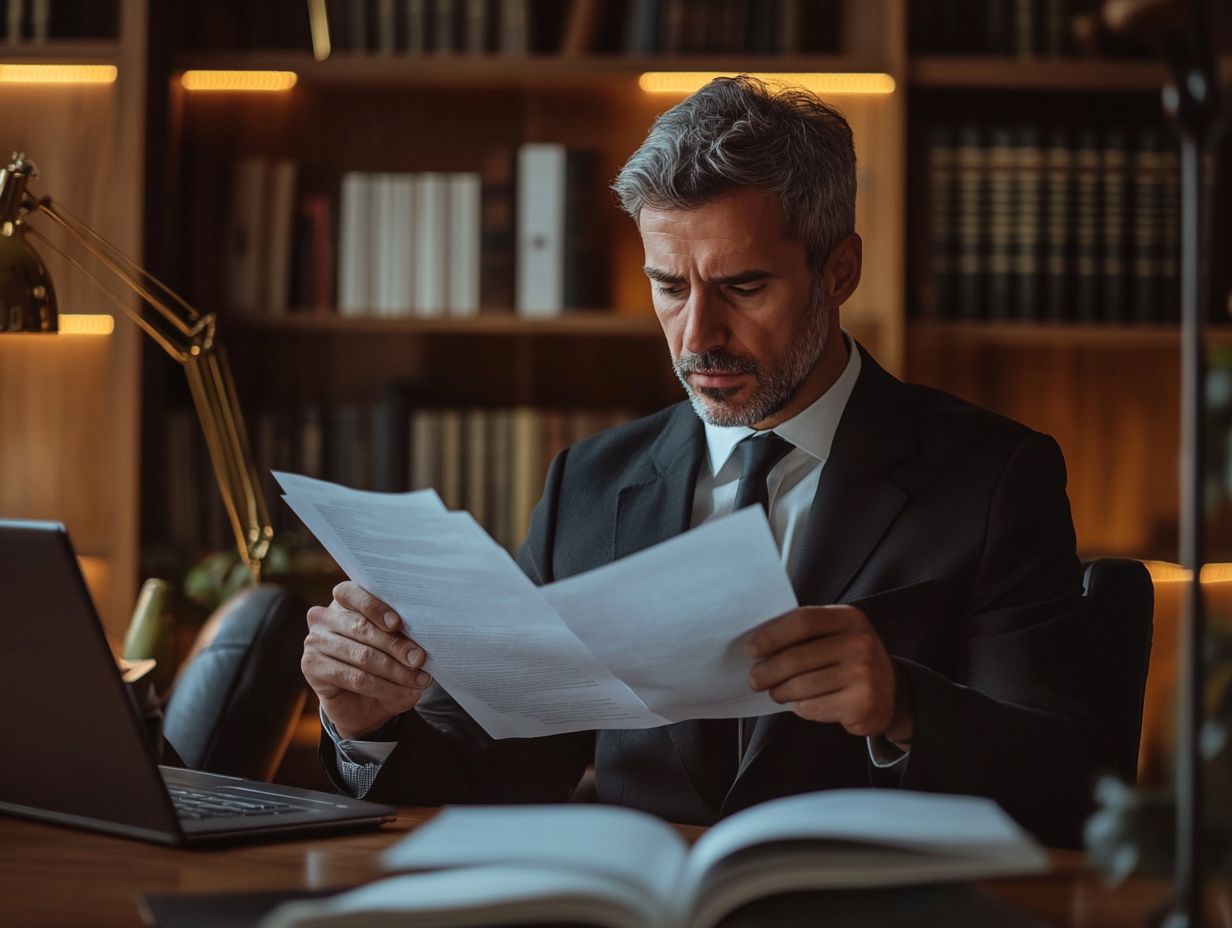
A defense attorney defends their client while a prosecutor builds a case against the accused.
What are the responsibilities of a defense attorney?
They conduct legal research, develop a defense strategy, and negotiate with prosecutors. They represent their clients in court and offer guidance throughout the legal process.
Can a defense attorney guarantee a specific outcome for my case?
No, a defense attorney cannot guarantee the outcome. The legal process is unpredictable, but skilled attorneys strive for the best results.
Can I choose my own defense attorney?
Yes, you can choose your defense attorney. It’s essential to find someone experienced in cases like yours and with whom you feel comfortable.
What should I expect from my defense attorney during my case?
Expect your attorney to keep you informed and explain your legal options. They should address your questions and work towards the best outcome for your case.

